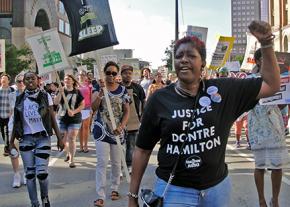Calling for police accountability in Madison
, , and report on a protest against racism and police brutality in Madison, Wisconsin, and the next steps in the struggle.
ACTIVIST GROUPS rallied outside the Madison Police Union headquarters in Wisconsin's capital on July 21 to take a stand against racism and police brutality as part of a national day of action.
A wide range of organizations endorsed and supported the rally, including Freedom Inc., the Young, Gifted and Black Coalition, Groundwork, No New Jail, First Unitarian Society Equity Ministry Team, Racial Justice Tipping Point, Families for Justice, Operation Welcome Home, U.N.I.T.Y. Inc. Now!, Wisconsin Coalition Against Sexual Assault and the International Socialist Organization.
Statistics show that Madison remains one of the worst places in the U.S. to live for people of color. According to a report from Race to Equity, Blacks make up 6.5 percent of the city's population, but 50 percent of the jail population, and Black children are eight times more likely to be arrested than their white peers.
Outrage over the murder of Mike Brown in Ferguson, Missouri, helped spark a new wave of organizing in Madison, which came to a head after the police killing of Madison resident Tony Robinson last year. Activists also spoke out about the continuing brutalization of Madison's Black citizens, including the arrest of Cierra Finkley for protecting herself and her daughter from an abusive partner who threatened to kill them.

More recently, police attacked 18-year-old Genele Laird by dragging to her ground, punching her in the kidney and Tasering her several times, before putting a spit hood over her head and arresting her.
Little more than a week later, police responding to a home invasion call murdered Michael Schumacher, a middle-aged white man who appeared to be in the middle of a mental health crisis.
The shooting occurred in the same neighborhood where Tony Robinson was shot to death the year before, making it the third police killing in the neighborhood since 2012. The failure to appropriately respond to a person in crisis was at play in all three killings, in spite of the 10 officers trained in mental health crisis response on the Madison Police Department's (MPD) bloated staff.
With demands for police accountability ringing out from all over the city, and Young Gifted and Black's newest campaign for community control over the police backed up by organizations like Freedom Inc., Groundwork, and No New Jail, City Council members have voted to spend $350,000 to investigate MPD regulations and practices.
ON JULY 21, a multiracial crowd of some 100 people rallied in front of Police Union Headquarters demanding community control over the police and justice for those who have been brutalized, while a group inside occupied the building to deliver their demands.
Commenting on police efforts to polish their image, Freedom Inc.'s M. Adams spoke outside headquarters in a sarcastic manner, "Now the police aren't that bad, they're at your barbeques. They hand out baseball cards."
She went on to say, "Barbeques do not fix lives! Bottles of water don't bring justice! We are not fooled by Officer Friendly!"
Protesters carried signs reading "Community Control of the Police" and "White Silence=Violence." Young, Gifted and Black leaders led chants of "Go home Po-po, we don't want no slave patrol" "Hands off Black women" and "Justice for Tony Robinson."
After rallying outside of the headquarters, protesters marched onto John Nolen Drive, a major commuter route in Madison, while chanting "All power to the people," effectively blocking traffic at rush hour. Eight protesters with their arms chained inside PVC pipes sat on a banner reading "Community control of the police" in the middle of the intersection.
Soon after, activists were told to vacate the street or risk arrest. When they left the street, nearly 30 police officers circled the chained protesters and would let no water or ice packs be brought to them, despite a heat index of 98 degrees.
Continued chants of "Free the 350" rang out, a reference to YGB's campaign to free 350 people of color convicted of crimes of poverty from the Dane County jail. "Where is Koval! We want Koval!" protesters chanted, referring to the Madison police chief.
Police vehicles then circled those in the street and made attempts to arrest the chained protesters. But since the police had failed to bring bolt cutters, the arrests were delayed by nearly an hour. Only after this slip-up did they allow food and water to be brought to activists in the street until police could later arrest them.
To add insult to injury, Black youth, who had been leading a majority of the chants, were barred access to the nearby hotel restrooms, despite white protesters having been let in. When the action was over, 11 people were arrested, and a fundraising page was set up for them to help cover bail and legal expenses.
While Madison, a primarily white, liberal city, has until recently boasted of its "exemplary" police force, the work of activists to highlight police brutality and racism has exposed this myth for many in the community. Madison has seen an increase in calls for police accountability from all levels of community leadership.
However, the backlash is also very visible. A reactionary "Blue Lives Matter" bill has been introduced in the state legislature recently, calling for attacks on police to be treated as hate crimes and "Blue Lives Matter" yard signs have cropped up in some neighborhoods.
Police killings and abuse go hand-in-hand with the attacks that Wisconsin workers are facing--from union busting to the defunding of education, the attack on reproductive rights, the destruction of the environment in Northern Wisconsin and more. Activists are attempting to connect these attacks and fight for the rights of working Wisconsinites--and a better world where workers have real control of their communities.


